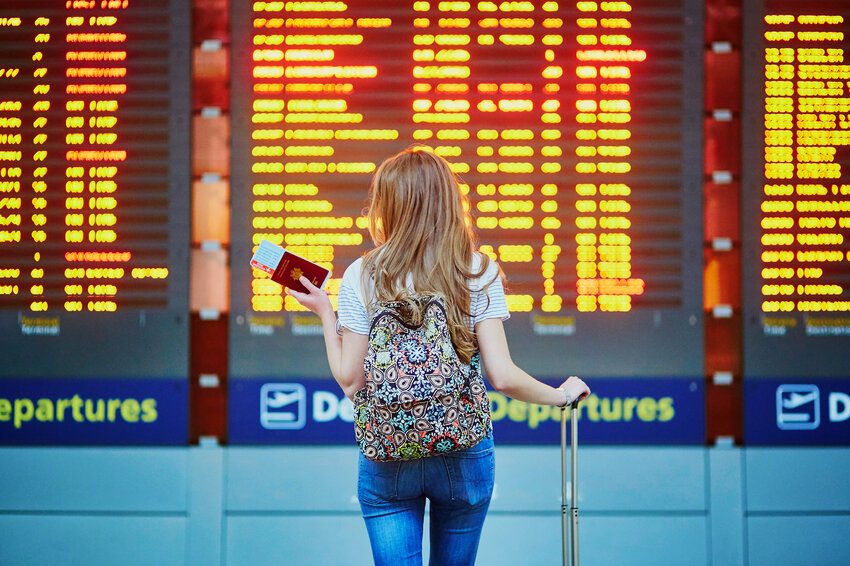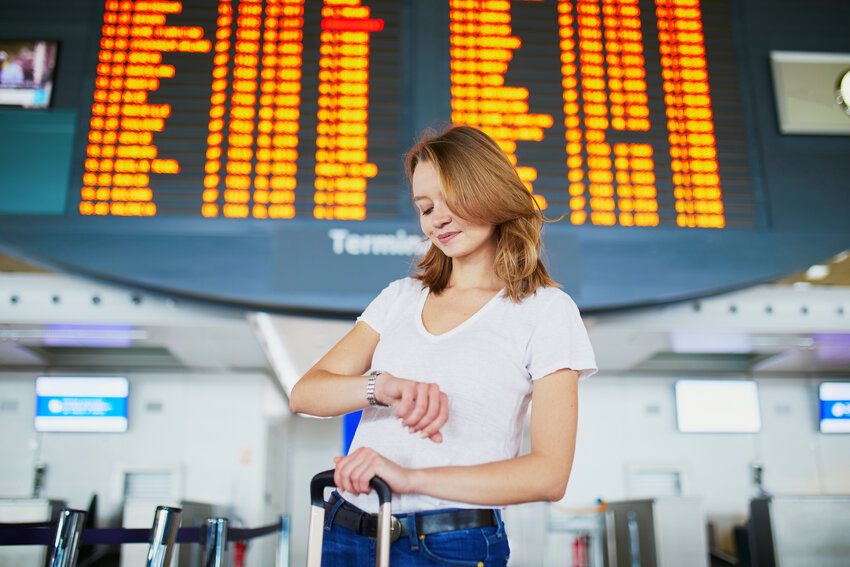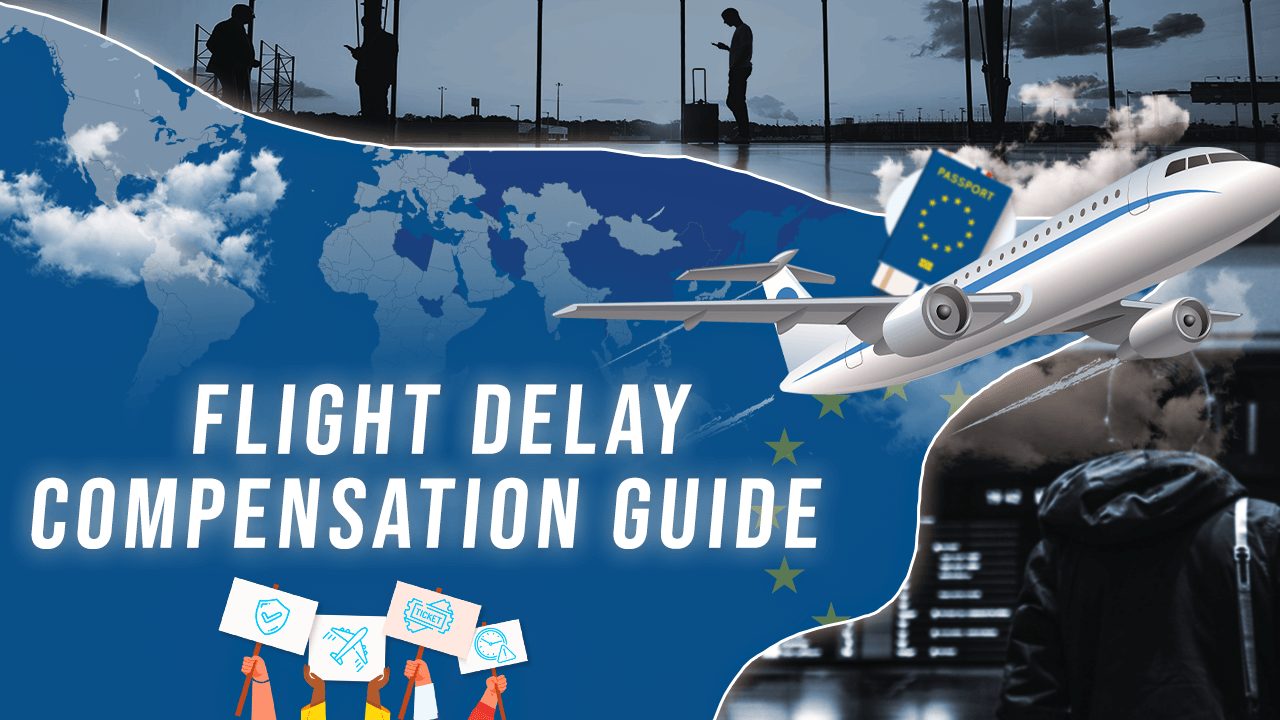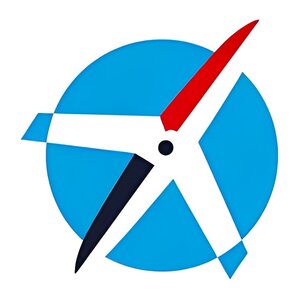If you’ve ever taken a flight, chances are you’ve faced a delay, and these inconveniences can completely derail your plans, leading to costly changes, unexpected expenses, and more. Thankfully, you may be eligible for compensation depending on how long your flight is. Here’s all you need to know about flight delay compensation. Information in this article was updated in 2025.
Key Takeaways
- The European Union’s EC 261 law provides strong protection for travelers who experience flight delays, covering flights that depart from, arrive in, or operate within the EU.
- The compensation amount under EC 261 depends on the length of delay and the flight distance, with amounts ranging from €250 to €600. Additional compensations like meals, refreshments, and accommodation should also be provided in certain circumstances.
- To file a compensation claim, passengers need to gather necessary documentation, which includes flight details such as flight number, departure and arrival times, and any communication from the airline regarding the delay.
- It’s important to ensure that accepting any form of immediate compensation like vouchers from airlines doesn’t waive your right to file a claim under relevant regulations for cash compensation later.
- Other jurisdictions like Brazil (ANAC 400 regulation) and countries under the Montreal Convention also provide provisions for flight delay compensation, indicating that passengers may have rights to compensation beyond EU borders.
Flight Delay Compensation Rights Overview
The European Union has regulations in place to protect passenger rights while flying. This powerful set of rules is called EC 261, and it holds airlines accountable when there are delays, cancellations, and denied boardings – as long as it’s in their control. It outlines what compensation you’re entitled to.
EC261/2004 covers more than just if your flight is delayed, so let’s break down everything you need to know about this rule to get the compensation you deserve. Generally, you will be eligible for compensation if:
- Your flight is delayed more than three hours.
- Your flight is cancelled, and you had less than 14 days’ notice.
- You are denied boarding for any reason out of your control, including overbooking.
Your flight must have touchpoints in the European Union, including point of origin, layovers, and final destinations, though coverage may vary if your air carrier is not based in the European Union.
EC261/2004 regulation strives to hold airlines accountable for circumstances within their control, and to do so, they hit them where they will hurt most: the wallet. There are some circumstances that the airline cannot control, and these would qualify as extraordinary circumstances. These include airport strikes, political unrest, and weather.
Still, the airline must prove that they took all reasonable measures to avoid the flight issue, and if other airlines were able to avoid it without delays or cancelled flights, then you may still be eligible to claim compensation. It doesn’t hurt to gather all your evidence and submit a claim, though you’ll have more luck if you work with a specialized company that understands the ins and outs of the laws.
In addition to compensation, EC 261 also outlines the care you’re entitled to receive during your delays. It is very robust, so understanding what you’re entitled to isn’t always easy to do on your own. In some cases, you are entitled to compensation, but airlines may try to get out of it, thinking you don’t understand your rights, so it’s important to cite EC 261 as you navigate your flight issues with the airline.
When Are You Eligible for Flight Delay Compensation?

If the airline is to blame, chances are you are eligible for compensation under EC 261, as long as the delay is at least three hours or more and it’s the airline’s fault. The amount of compensation you’re entitled to depend on how long your delay was, the length of your flight, and the destinations. You can receive up to €600, but you have to file a claim first. You will not receive the compensation unless you ask for it.
So, what are the circumstances that make you eligible for compensation? You must meet one or more of the following criteria.
- You arrived more than three hours late at your final destination.
- You checked into your flight on time.
- Your flight began or ended in the European Union.
- The airline was at fault for the delay, whether it was because of an airline strike, operational issues, and technical difficulties.
The time frame you have to file a claim depends on where the issue occurred. Typically, you have at least three years to file a claim, but you’ll want to check with the country to be sure. The faster you file a claim, the better it will be. The details and documentation will be fresh in your mind.
Even if the airline has already provided you with some care, you can still file a claim. Often, airlines will try to sweeten the deal with food, refreshment, travel vouchers, miles, and more. They do this as a goodwill gesture to appease their customers and because they don’t want you to file claims.
As long as the issue wasn’t your fault and within the airline’s control, you should be eligible to file a claim for additional compensation under EC 261 – unless you voluntarily relinquished your seat in exchange for goods from the airline.
Which Flights are Covered?
The EU has great passenger protection laws that advocate for your rights on behalf of the airlines; however, not all flights are covered under EC 261. Even more so, many think it only applies to flights within Europe, but that’s not the case! Almost all routes within the European Union and Europe itself are covered. This includes EU airspace and others, including Iceland, Norway, Switzerland, and the outermost regions like French Guiana and Martinique, Guadeloupe and La Réunion, Saint-Martin, Madeira, the Azores, and the Canary Islands.
Every part of your flight doesn’t have to be in the EU for you to qualify for compensation, though it does make it easier. As long as the point of your delay is, you can rest easy knowing that you can file a claim. You may also be eligible to file a claim if your flight departs from outside the EU, but you’re on an EU-based carrier. There are some exceptions, most notably if your flight is a non-EU-based carrier; however, it doesn’t hurt to file a claim to see if you can recoup any losses.
Many circumstances that lead to delays are preventable, which is why lawmakers put EC 261 in place.
What Flights aren’t Covered?
If you’re flying in the United States and hoping to claim under EC 261, you’ll be disappointed! Your flight has to have a touchpoint in the EU for it to qualify, though it doesn’t have to stay in Europe at all points. Flights that are from outside the EU to inside the EU if you are using non-EU-based carriers are also not covered. There may be an exception if your flight is an EU-based carrier and you have a connection within the EU.
Also, the issue had to be in the airline’s control for it to be covered. If it’s not, then it may be deemed extraordinary circumstances. These include:
- Weather
- Airport or air traffic control strikes
- Political unrest
- Security risks
Now, in some cases, the airline can still be held accountable if the issue starts out as extraordinary circumstances if they took no measures to avoid them. For example, if the weather system was avoidable with minimal delays and they chose to gamble the odds, they could still be at fault, especially if other airlines were able to avoid it. It never hurts to file a claim, even if you think your flight may not be covered.
Can you get Compensation for Missed Connections?
If you missed your connection because of an airline delay, you are eligible to file a claim under EC 261. Now, before you get to that step, you want to work directly with the airline to find a new flight. They are required to help you if the cause for the delay and the missed connection was their fault because of an initial delay.
Now that you have your new flight, are you arriving at your new destination more than three hours late? If so, you are eligible for compensation of up to €600, depending on how late you were, how far you were traveling, and where you were trying to get to. If your delay is less than 3 hours, then you will not be eligible for compensation. It can be stressful if you miss your connection, so focus on getting to your destination first. The rest can wait – just don’t wait too long that you forget!
Make sure to get in writing the reason for your missed connection from their airline to help support your claim. That will make getting compensation for your missed connection easier when the airline admits it is at fault.
What Flight Delay Compensation Can You Get?

You never have to guess when it comes to how much compensation you’re entitled to during a flight delay. EC 261 does a great job of laying it out clearly, so there are no questions as long as you meet the criteria to file a claim.
- Your flight must be at least 3 hours delayed,
- You must have a touch point in the EU.
- The issue that caused the delay must be the airline’s fault.
If your flight does not meet these criteria, then you cannot file a claim under EC 261. If you want additional compensation, try to work with your airline directly. They may offer some as a goodwill gesture, including vouchers, miles, free meals and drinks, and more. Depending on the length of your delay, they may be required under law to provide free access to food, transportation, and a place to sleep. Compensation under EC 261 isn’t always monetary, so be aware of your full range of rights when you’re facing a delay.
How much compensation you’re entitled to depend on the length of your delay, where you’re going, and how far you’re traveling. This is the same whether your flight is delayed or cancelled, so there’s uniformity in what you can expect. It makes understanding the law much easier than some other similar flight compensation laws that rely on damages. EC 261 is easy to understand and helpful in making sure you get the compensation you deserve.
If you are flying within the EU or European airspace, it’s worth filing a claim to see if you can get anything under EC 261. It’s a generous regulation that tends to favor the passengers as long as the circumstances are within the airline’s control. Most circumstances are preventable with a little more planning and consideration from their airline.
How Much Compensation Can You Claim For A Delayed Flight?
Flight delay compensation calculated under EC 261 is a flat rate that’s broken down by the number of kilometers and where you are flying. This calculates to the following rates.
Short flights
Mid ranged flights
Long flights
You can calculate your flight distance bellow.
You will not receive more than €600 under EC 261 for a flight delay. However, you can receive additional compensation from the airline directly, including miles, accommodations, meals, and more. Ultimately, they need to do what they can to make it right. You should not incur additional costs as a result of their airline’s negligence.
Keep in mind that if you voluntarily give up your seat, you will not be eligible to file a claim, even if your flight was severely delayed. Everything has to be within the airline’s choice and control to be eligible for compensation under EC 261. Sometimes, the compensation the airline is offering you exceeds the value you’d get under EC 261, so make sure to consider your options carefully.
Can You Claim if Traveling for Business?
Often, the people who face the most delays are those who travel for business. They’re always hopping from country to country to make a deal or check a site, working away on their smartphone and laptops at every step of the journey. However, they are also the most unlikely to file a claim because they didn’t pay for the ticket. Don’t let that stop you! As the passenger, it was your time that was wasted when the airline delayed your flight, even if it was done during business hours.
Because of that, you are eligible to receive compensation if your flight is delayed. It doesn’t matter if you are a public official, private-sector employee, or stay-at-home parent. You can claim against EC 261. Even if you’re working while you wait, that is no excuse not to file a claim. Gather the documentation and submit it on your own behalf. The only way to prevent these issues from happening in the future is to hold the airlines accountable, so don’t let them get away with it – even if you didn’t buy the ticket yourself. EC 261 doesn’t care who bought the ticket. They only advocate for the passenger.
What Care Are You Entitled To For Delayed Flights?

You already know that you’re entitled to up to €600 in compensation if your flight is delayed, but did you know that you have other rights in addition to this? You have the right to care while you wait, and that includes access to communication, meals, and more.
If your flight is more than 5 hours delayed, then you are entitled to a full or partial refund of your original ticket if you so choose. You can also receive a flight back home if you’re in the middle of your trip. You have the right to reimbursement and rerouting after 5 hours, and it will not impact your ability to file a claim.
Additionally, as you’re navigating alternative flights with airline officials, you are also eligible to be upgraded at no cost to you. This can be a rarity, so count your blessings if you receive a free upgrade. It’s more likely that the opposite will happen. You may be offered a downgrade, and if you’re able, take it. You can get a reimbursement of between 30 to 75 percent of the price that you originally paid.
Don’t hesitate to ask for additional compensation from their airline as you wait, even if you intend to file a claim under EC 261. As long as you don’t voluntarily surrender your reservation, then you can still file a claim. As you wait, their airline can offer you meals, travel vouchers, airline miles, and more. If the value of their offer exceeds what you can get from EC 261, you may want to consider voluntarily giving up your spot, as long as you understand that disqualifies you from future claims with this flight.
If your delay is overnight, they may also need to offer you accommodations or travel to your accommodations. Consult the airline directly in the case of these extended delays to understand your rights.
Flight Delay Compensation Time Limit
You have to file a claim in a timely manner under EC261/04, though the amount varies from country to country. Keep in mind that you need to file a claim in the country that the airline is based, not your country of nationality, the country you departed, or the country you arrived in. Filing in the wrong country could cause a delay in your compensation, so it’s important to understand where the airline is based.
Depending on the country, you can make claims between 1 to 10 years, though there are some exceptions to the rule.
| Country | Limitation period |
|---|---|
| Austria | 3 years |
| Belgium | 5 years |
| Bulgaria | 1 year |
| Croatia | 3 years |
| Cyprus | 6 years |
| Czech Republic | 3 years |
| Denmark | 3 years |
| Estonia | 3 years |
| Finland | 3 years |
| France | 5 years |
| Germany | 3 years |
| Greece | 5 years |
| Hungary | 5 years |
| Iceland | 2 years |
| Ireland | 6 years |
| Italy | 2 years |
| Latvia | 1 year |
| Lithuania | 3 years |
| Luxembourg | 10 years |
| Malta | No limit |
| Netherlands | 2 years |
| Norway | 3 years |
| Poland | 1 year |
| Portugal | 3 years |
| Slovakia | 2 years |
| Slovenia | 2 years |
| Spain | 5 years |
| Sweden | 10 years |
| Switzerland | 2 years |
| United Kingdom | 6 years |
Has your flight been delayed?
Don’t let delayed flight issues cost you – get compensated up to €600!
Refunds, Cash Compensation, and Flight Vouchers
When airlines are trying to manage unhappy customers, they start to get liberal with the rewards. This can be great for some, but those who understand their rights under EC 261 may be hesitant. You need to check that by accepting any of these perks, you’re not waiving your right to claim compensation against this delay in the future. Read the fine print – it’s worth it. Generally speaking, if you voluntarily give up your reservation, then you are not entitled to additional compensation under EC 261. You made a choice. The airline didn’t make it for you.
If accepting these benefits doesn’t waive your rights, feel free to take them without reservation! EC 261 clearly states that any compensation that a passenger is to receive should be in the form of cash, electronic transfer, or check. The customer can choose to accept payment in the form of travel vouchers. If you do not want a voucher or miles, insist on cash. They need to pay you out. When you have cash, you aren’t limited to reusing them with the same airline as you are with airline vouchers. Most airlines won’t pay you out immediately, so you’ll need to file a claim.
If your flight has been delayed for more than 5 hours, you are eligible for a refund. This should not impact your chances of filing a claim in the future because it is protected under EC 261. In some cases, the benefits that the airline is offering you do outweigh what you are entitled to under the law. In these cases, the airline is desperate, so they are willing to make concessions they wouldn’t otherwise. Weigh your options. You may get more if you are worth with the airline, though there will be more strings to their compensation.
How to Claim Compensation for Delayed Flights?

You have options when it comes to filing a claim. You can file yourself or through a specialized company. Filing yourself can be tricky, and many times airlines will blow you off because they think you don’t know your rights. They’ll deny your claim, and you’ll have to file an appeal. You’re at their mercy, which isn’t a great place to be. Even if you are well within your rights, you still may not get your money.
That’s why filing with specialized companies may be helpful. They know the laws and how to get you the compensation you are entitled to. Most times, you only pay if you win, so these companies only accept cases they know they can win. They take a flat fee off the top of your winnings, though some companies will also charge additional fees if they need to go to court. You hand over your case to them, and they do all the hard work for you. Within months, you’ll have your payout, so you can live to travel another day. You can find the best flight delay compensation companies bellow.
Make sure that you file your claim within the allotted time. Countries have different regulations, so even if you have a case, if you miss out on the window, then you will not receive compensation. That’s why it’s best to file immediately while the irritation is fresh. You’ll have all your documentation ready for however you decide to file a claim. This documentation is essential, so make sure to get everything in writing that you can.
Documentation needed
Before you can file a claim, you need to gather your documentation together. This starts with your boarding information, flight information, and type of delay. Input your original departure, what time you actually left, when you were supposed to arrive, when you actually arrived, your flight number, and more. If you have in writing the cause of your delay, include that as well. The more information that you can include, the better! But it is always best to start from official EC261/2004 claim form.
Remember, you’re making your case here. It is up to you to prove that a delay happened, and the airline needs to refute it. Take a picture of the departure board or screenshots of any communication that you received from the airline regarding your delay. Ask the airline to pay for your meals and refreshments. If they don’t, save all your receipts. If your delay is overnight, request accommodation and transport as needed. If your flight is more than 5 hours delayed, you can request a refund and a flight back to where you came from if applicable.
Most importantly, don’t sign anything that waves your rights. If the airline provides anything for you, make sure to read it carefully so that you don’t unintentionally do something you’ll regret. Keep copies of everything you’ve signed. Once you have everything, you’re ready to file a claim. Your odds of being successful are higher if you work with a specialized company. They handle all claims and communication, so you don’t have to, all for a nominal fee off the top of your winnings.
Additional Flight Compensation Laws
EC 261 isn’t the only flight compensation law in place to help protect customers against airline issues. There are a few others that you’ll want to keep in mind, so even if you aren’t flying in the EU, you may still be eligible for compensation. Some of the laws, like EC 261 and the Montreal Convention, overlap, while others apply to domestic flights only.
At the end of the day, countries are starting to realize that airlines take advantage of their customers, and they are making moves to stop that from happening while creating a more efficient air transport system.
US Passenger Laws
Unfortunately, the laws are behind when it comes to flight delay issues in the United States. They do not have any overarching rules in place that would protect the passenger. Instead, they choose to leave it to the airline’s discretion what passengers are entitled to, and because of that, it often favors the airline. Read their terms to see what you are entitled to when it comes to flight delays. They will spell it out in their bylaws.
You can always contact customer service if you’re flying in the US and face a delay. They may offer you vouchers, miles, free drinks, free meals, and more as a good faith gesture. You have many options of which airline to fly, so it’s in their best interest to keep your business. Unlike in Europe, it doesn’t really matter if you voluntarily give your rights up because you’re not able to file claims with any governing body.
The United States Department of Transportation does have some rules in place for tarmac delays, lost luggage, and overbooking, though again, they are not as robust as their European and South American counterparts.
The exception to this rule is if you start in the United States but end in Europe – or vice versa. If your flight that’s in the EU is delayed, then you can claim on that leg instead of the entire trip. You may want to submit a claim just to see, but generally, if you’re only flying within the United States, you don’t have a ton of rights.
Brazilian ANAC 400
Brazilian ANAC 400 helps protect customers against airline delays, cancellations, denied boarding, lost baggage, and more – just as long as your flight has something to do with Brazil. Whether it’s a domestic flight within Brazil, an international flight that starts or ends in Brazil, or flights that connect via Brazil, you’re covered under Brazilian ANAC 400. Even if your ticket is issued in Brazil though the flight is operating abroad, you’re still eligible.
If the airline changes your flight, delaying you, you are eligible for compensation. They have to notify you at least 72 hours in advance if your domestic flight is delayed more than 30 minutes or your international flight is delayed more than 1 hour. If not, they need to provide you with an alternate flight or a full refund.
They also have consumer laws in place that you can file for additional compensation of up to €1,800, which is nice additional compensation. You are eligible for additional compensation if your flight is cancelled or you are involuntarily denied boarding at no fault of your own. The rates are a little less standard than EC 261, but in some cases, that will work to your benefit.
You have five years to file a claim for domestic flights and two years to file a claim for international flights, so make sure you do so in a timely manner. If you miss your window, even if your claim was valid, you will not be eligible for compensation under Brazilian ANAC 400 or their consumer laws.
Montreal Convention
The Montreal Convention is an international statute that has been in place since 1999. There are more than 135 countries that are members, meaning that you will be protected when you fly between these eligible countries and territories. The biggest point of the Montreal Convention is that your flight has to be international. If you are flying domestically, you’ll want to check local regulations to see if you have protection.
Delays are covered under the Montreal Convention, though compensation works a little differently under these regulations. You are allowed to file for damages, both financial and emotional, as part of the Montreal Convention. So, when you’re filing as a result of a delayed flight or missed connection, you are not filing for the flight. Instead, you’re filing for the damages that you incurred as a result of it.
It’s easy to understand your financial damages. If you purchased meals, accommodation, clothing, transportation, and other incidentals as a result, then you want to be reimbursed. But also consider if you missed something important. Those are less easy to quantify but still eligible under the Montreal Convention. Because of that, it may be better to work with a company when filing for emotional damages.
Your damage claims cannot exceed €7,000 under the Montreal Convention, and you’ll need to submit clear documentation that supports your claims, so make sure to keep everything. You have up to 2 years to file a claim for a flight delay, but the sooner, the better!
Recently Delayed Flights
| Date | Airline (Flight number) | Route | Status | Your compensation |
|---|
Video Version
Conclusion
Flight delays happen, but they don’t have to derail your plans entirely – and, if they do, you may be entitled to receive compensation for your inconvenience. The amount depends on your trip – the distance, location, and length of delay – so make sure to keep your documentation and file a claim.
FAQ
-
What is flight delay compensation?
Flight delay compensation is a monetary amount that airlines are obligated to provide to passengers when their flights are significantly delayed, typically over three hours. This is mandated by certain passenger rights laws, most notably European Regulation EC 261/2004, as a way to compensate for the inconvenience caused to travelers. The compensation does not apply in all circumstances, such as when the delay is due to extraordinary circumstances beyond the airline’s control.
-
How much is flight delay compensation?
Under EC 261, the compensation for flight delays ranges from €250 to €600, depending on the distance of the flight and the length of the delay. For example, for flights of up to 1,500km, the compensation is €250. For intra-EU flights over 1,500km and other flights between 1,500km and 3,500km, the compensation is €400. For flights over 3,500km, if the delay is between 3-4 hours, the compensation is €300, and for delays over 4 hours, it is €600. Other jurisdictions may have different compensation amounts.
-
How long can a flight be delayed before compensation?
Under European Regulation EC 261/2004, compensation is due if a flight is delayed by three or more hours upon arrival. It’s important to note that it’s the arrival time that matters, not the departure. For example, if a flight departs four hours late but makes up time and arrives only two hours late, it wouldn’t be eligible for compensation under EC 261. Other countries may have different rules regarding flight delay compensation.
-
How to get compensation for delayed flight?
To get compensation for a delayed flight, you need to file a claim with the airline. This typically involves filling out a form on the airline’s website or contacting their customer service. Include EC261 compensation claim form and all relevant information about your flight, such as flight number, the scheduled and actual departure and arrival times and any communication you received from the airline about the delay. It may be helpful to engage a specialized flight compensation company to handle the process on your behalf. However, this is a paid service and they will take a portion of the compensation as their fee. Remember, you must file your claim within the time limits set by the relevant law, for example, within two years under EC 261.
-
How long do I have to claim compensation for a delayed flight?
The time limit varies by country. In many EU countries, you can claim for flights going back as far as six years.
-
What if the airline offers me vouchers or miles instead of cash?
Under EC 261, you have the right to insist on cash compensation. While accepting vouchers or miles does not waive this right, make sure to read any fine print to ensure you’re not unintentionally waiving your rights.
-
Do I have rights if my flight is delayed due to extraordinary circumstances like bad weather?
Generally, airlines are not obligated to provide compensation for delays due to extraordinary circumstances outside of their control, such as severe weather or air traffic control strikes.
-
Can I claim compensation if my flight was delayed but I chose to not travel?
If your flight is delayed for more than 5 hours, you have the right to a refund if you choose not to travel. However, you may not be entitled to additional compensation.
-
What documentation do I need to claim flight delay compensation?
Start from EC261/2004 compensation claim form and gather all relevant flight information, including your boarding pass, flight details, and any communication from the airline about the delay.
-
Does flight delay compensation apply only for EU flights?
While EC 261 covers EU flights, other countries like Brazil also have their own laws for flight compensation. In addition, the Montreal Convention covers international flights between participating countries.
-
What if the airline refuses my compensation claim?
If the airline refuses your claim and you believe you have a valid case, you can take the claim to a national enforcement body or consider legal action. Many passengers choose to work with specialized companies who handle these claims on their behalf.
-
What to do if your flight is delayed?
In case of a flight delay, stay informed about the status of your flight through airline notifications or by checking the flight information displays. If the delay is significant, the airline may provide assistance such as meals, refreshments, or accommodations. Stay in touch with the airline, follow their instructions, and know your rights regarding compensation for extended delays.





